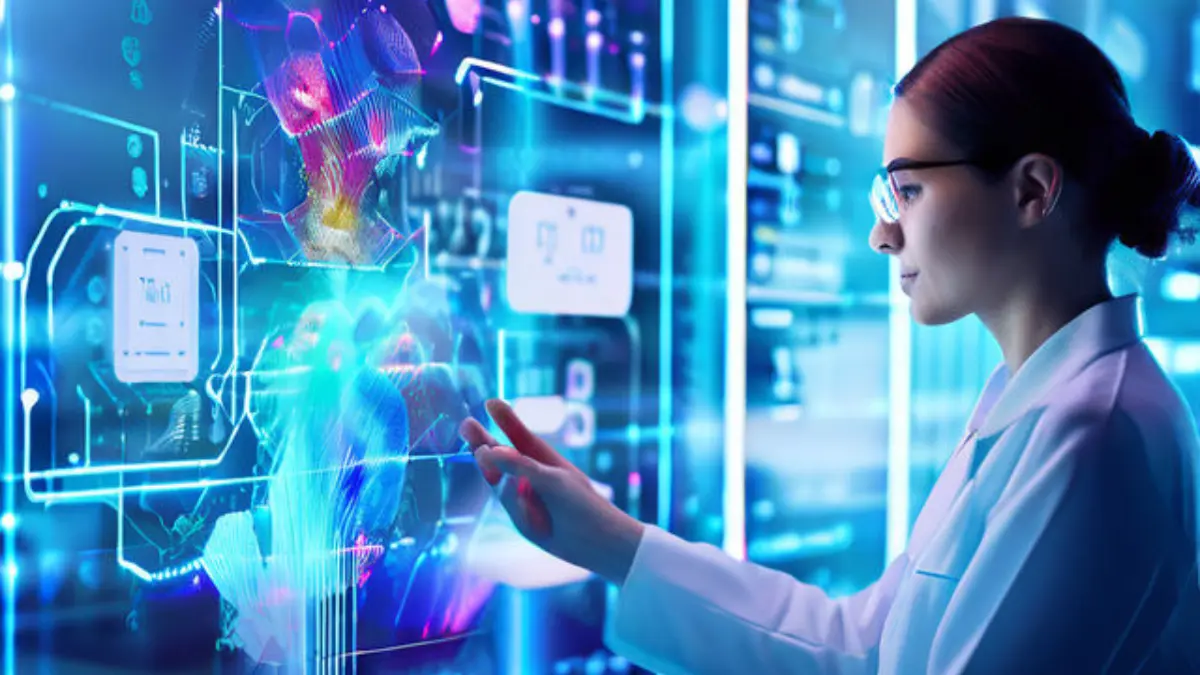In recent years, the pace of progress in AI technology has been nothing short of remarkable. What was once confined to science fiction novels and movies has now become a tangible reality, permeating various aspects of our daily lives. From voice assistants like Siri and Alexa to autonomous vehicles and predictive algorithms, AI has firmly established its presence in the modern world.
The evolution of artificial intelligence from a science fiction concept to real-world applications has been both fascinating and transformative. We’ve seen AI evolve from fantastical portrayals in movies to practical solutions that drive innovation across industries. This transition has not only captivated our imaginations, but it has also altered how we perceive and interact with technology.
As we stand on the cusp of this AI revolution, it is important to delve deeper into its impact on our human narrative. This exploration will highlight the myriad challenges and opportunities presented by AI, from revolutionizing industries to redefining the structure of our society. In this blog, we will learn about the complexities of AI’s impact on our lives, and highlight its potential to profoundly shape our future.
Table of Contents
The Evolution of AI: From Fiction to Reality
Let’s take a journey through time, where the lines between fantasy and reality blur as we trace the evolution of artificial intelligence (AI).
In the realm of science fiction literature and movies, AI has long captured our imaginations. From the sentient robots of Isaac Asimov’s novels to the iconic HAL 9000 of “2001: A Space Odyssey,” AI has been portrayed as both friend and foe, often symbolizing our concern and hopes about the future of technology.
But beyond the realm of imagination, the development of AI technologies in the real world is nothing short of extraordinary. What began as theoretical concepts in the minds of visionaries has now transformed into tangible innovations that shape our everyday lives.
Throughout history, there have been important milestones in AI research and innovation that have inspired us to move forward. From Alan Turing’s groundbreaking work in the 1950s to the development of neural networks and deep learning algorithms in recent decades, each milestone has brought us closer to realizing AI’s full potential.
These advancements have paved the way for practical applications of AI in a variety of sectors, from health care and finance to transportation and entertainment. Today, AI-powered technologies like voice assistants, image recognition systems and autonomous vehicles are becoming increasingly ubiquitous, fundamentally changing the way we live, work and interact with the world around us.
As we continue to push the boundaries of AI technology, it is clear that we are witnessing a transition from imagination to reality in real time. And with each new breakthrough, we move one step closer to unlocking the true potential of artificial intelligence in shaping the future of our world.
AI in Everyday Life: Shaping Our Human Experience
Have you ever stopped to think about how much AI impacts your daily routine? It is more than just a buzzword; It is woven into the fabric of our lives, making tasks easier, faster and often more enjoyable.
Let’s take a look at how AI is quietly revolutionizing various aspects of our daily lives. In healthcare, for example, AI acts as a silent guardian, assisting doctors in diagnosing diseases, predicting patient outcomes, and even personalizing treatment plans. This means faster and more accurate diagnoses, which will ultimately save lives and improve healthcare quality.
But it does not end there. Have you ever admired the convenience of ride-sharing services such as Uber or Lyft? AI algorithms are working behind the scenes to optimize routes, match drivers and passengers, and provide a smooth and efficient ride experience. It’s no longer enough to get from point A to point B; it’s also important to do so smoothly and efficiently.
And what about entertainment? AI is changing the way we consume media, from personalized recommendations on streaming services like Netflix to the development of immersive virtual reality experiences. Whether it’s recommending your next binge-worthy show or improving your gaming experiences, AI is expanding our entertainment options and tailoring them to our preferences.
The benefits of AI-powered technologies extend beyond personal convenience to societal progress. In agriculture, AI-powered drones can monitor crop health and optimize irrigation, leading to increased yields and sustainable farming practices. In the manufacturing sector, AI-enabled robots are streamlining production processes, reducing errors and improving efficiency.
These examples only scratch the surface of AI’s ability to shape the human experience. From healthcare to transportation to entertainment and beyond, AI is transforming industries and sectors in ways we could not have predicted just a few years ago. So, the next time you ask Alexa for the weather forecast or get into an autonomous vehicle, remember that you’re witnessing the ongoing evolution of artificial intelligence and its impact on our daily lives.
Challenges and Ethical Considerations
Now, let’s take a closer look at some of the tricky areas where AI faces ethical hurdles.
- Privacy Concerns: Imagine you’re chatting with your friend about your upcoming vacation plans, and moments later, targeted ads for travel agencies start appearing on your social media feed. This is not magic; These are AI algorithms that analyze your interactions and online behavior. While this may seem convenient, it raises concerns about privacy violations and misuse of data. We need to balance the benefits of personalized experiences with the protection of our privacy rights.
- Job Jitters: Picture this: Robots and AI systems are taking over tasks that were once performed by humans. While automation can streamline processes and increase efficiency, it also brings the fear of job displacement. We must address the challenge of reskilling and upgrading the workforce to adapt to the changing landscape and ensure that AI complements human capabilities rather than completely replacing them.
- Bias Bugaboos: AI algorithms are only as good as the data they are trained on. But what happens when that data reflects societal biases? We have seen examples where AI systems perpetuate discrimination based on race, gender or socioeconomic status. Recognizing and correcting these biases is important to ensure fair and equitable outcomes in AI applications.
- The Call for Responsibility: To address these challenges, responsible AI development and governance are required. This entails integrating ethical considerations into the design, development, and deployment of AI systems. It also requires transparency in how AI algorithms work and the data they use. We can direct AI technologies toward the greater good by encouraging accountability and oversight.
- Solutions on the Horizon: Fortunately, there are ways to deal with these ethical dilemmas. We can take proactive steps to mitigate the negative effects of AI, such as implementing strong data privacy regulations and promoting diversity and inclusivity in AI teams. Education and awareness play an important role in empowering people to understand and navigate the ethical implications of AI technology.
In essence, while AI has enormous potential for innovation and progress, we must exercise caution to ensure that it is consistent with our values and protects our rights. By confronting these challenges and advocating for responsible AI practices, we can harness AI’s transformative power while preserving our humanity.
The Human-AI Collaboration
Humans and AI are creating a dynamic partnership, blending the best of both worlds to unlock new realms of creativity, innovation and problem-solving. This symbiotic relationship sees humans using AI as a powerful tool, enhancing our capabilities and expanding our horizons.
AI complements human ingenuity by processing vast amounts of data at lightning speed, uncovering insights and offering solutions we might not have otherwise found. Humans and AI together form a strong team that tackles complex challenges in various fields.
Take the field of healthcare, for example, where AI helps doctors diagnose diseases more accurately and develop personalized treatment plans. In the fields of art and music, AI collaborates with creators to create new compositions and visual masterpieces. Even in business, AI-powered analytics empowers decision makers with actionable insights, driving growth and innovation.
These examples demonstrate the transformative potential of human-AI collaboration. By embracing AI as a partner rather than a competitor, we can harness its capabilities to drive progress and shape a brighter future for humanity.
Navigating the Future: Opportunities and Responsibilities
As we look to the horizon, the possibilities that AI offers for shaping our future are limitless. From revolutionizing healthcare to optimizing transportation systems, AI promises to open new frontiers of innovation and efficiency. However, great power carries great responsibility.
It is imperative that we equip ourselves with the necessary knowledge and awareness to thrive in an AI-driven world. Education plays an important role in preparing individuals and communities for the transformative changes that will occur in the future. By fostering a culture of continuous learning and adaptation, we can harness AI’s full potential and minimize its potential harms.
Yet, as we embrace the opportunities that AI offers us, we must also remain steadfast in our commitment to responsible development and deployment. This includes prioritizing ethical considerations, protecting privacy, and ensuring inclusivity and fairness in AI systems. By adopting a human-centered approach, we can steer AI development toward a future that benefits all of humanity. It is time to take action and shape a future where AI will act as a force for good, enriching our lives and empowering our collective journey.
Conclusion
In the tapestry of human history, the emergence of AI marks a profound chapter – a chapter defined by innovation, opportunity, and responsibility. As we conclude this exploration into the age of AI, one thing becomes crystal clear: our future is tied to the development of artificial intelligence. With limitless opportunities on the horizon, it is our responsibility to navigate this landscape with foresight and compassion.
By embracing the transformative power of AI while remaining vigilant in our commitment to ethics and inclusivity, we can shape a future where technology will act as a catalyst for positive change. Let us embark on this journey with a spirit of curiosity, resilience, and humility, knowing that together, we have the power to shape a world where AI enriches the human experience and leads us to a brighter tomorrow.
Also have a look on “7 Ways To Make Money With AI“

